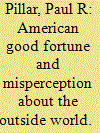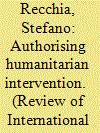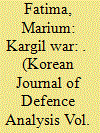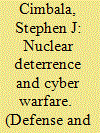| Srl | Item |
| 1 |
ID:
149499


|
|
|
|
|
| Summary/Abstract |
PAUL R. PILLAR assesses how Americans’ unusually favorable circumstances and experiences shape their perceptions of the rest of the world. He argues that as a result of these experiences, American have difficulty understanding the security and economic challenges facing other nations and overestimate how well those nations can create stable democracies.
|
|
|
|
|
|
|
|
|
|
|
|
|
|
|
|
| 2 |
ID:
151647


|
|
|
|
|
| Summary/Abstract |
Even scholars who support multilateralism in principle frequently question the value of securing approval from existing multilateral bodies for humanitarian intervention. The United Nations (UN) and regional organisations such as NATO, the argument goes, are far from democratic; furthermore, multilateralism is often a recipe for doing nothing; therefore, unauthorised intervention should be permissible in circumstances of ‘humanitarian necessity’. This article maintains that although today’s multilateral organisations and related procedures for authorising armed intervention may be suboptimal, they have significant output legitimacy. First, existing authorisation procedures reduce the risk of destabilising conflict spirals among powerful states. Second, they diminish the likelihood that humanitarianism will be used as a pretext. Third, they reduce epistemic problems concerning the identification of a just cause for intervention and thus the risk of accidental abuse. Fourth, they minimise the ‘moral hazard’ of humanitarian intervention. Finally, compliance with multilateral procedures is increasingly required for successful peacebuilding. This leads me to conclude that humanitarian warfare should always be authorised by the UN or regional multilateral organisations.
|
|
|
|
|
|
|
|
|
|
|
|
|
|
|
|
| 3 |
ID:
166009


|
|
|
|
|
| Summary/Abstract |
The main goal of this article is to explain the American failure of deterring North Korean nuclear proliferation. Specically, it examines the underlying reasons for which U.S. inhibition policy toward North Korea has failed, despite the numerous attempts by U.S. administrations (both Republicans and Democrats) to prevent North Korea’s nuclear development. The central thesis of the article is that while there were multiple reasons for the American failure of North Korean proliferation, the most important ones were U.S. misperceptions about both North Korea’s and China’s intentions and U.S. distraction by the war on terror. These factors, along with Pyongyang’s shrewd strategies to manipulate Washington, Seoul, and Beijing, played a key role in the emergence of a nuclear North Korea.
|
|
|
|
|
|
|
|
|
|
|
|
|
|
|
|
| 4 |
ID:
148538


|
|
|
|
|
| Summary/Abstract |
In the winter of 1998-99, the inexplicable presence of Pakistani troops under the pretext of being local freedom fighters in the Indian-administered side of Kashmir brought the region to the brink of a nuclear war. This paper probes the military rationale behind Pakistan`s initiative, organizational interests, internal politicking among different state organs, and the role of a few powerful individuals in the operation. It takes into account the important dimensions of strategy employed during the preparations for the Kargil War and the errors on the part of Pakistani planners which if addressed could have reversed the outcome of the operation. The controversies surrounding the Kargil conflict are discussed through the works of academicians and memoirs of the military commanders from India and Pakistan. The first part of the paper focuses on the rivalry and causes of the outbreak of war between India and Pakistan by explaining the beliefs and psychology of the military planners based on the premise of Cashman and Robinson. The second part reviews the political and nuclear milieu in which the conflict took place, while the third part accounts for the international efforts to prevent the conflict from escalating. The fourth part draws conclusions from the entire episode, indicating the discrepancies on both sides and the evidence that Kargil was unique because it challenged the military logics.
|
|
|
|
|
|
|
|
|
|
|
|
|
|
|
|
| 5 |
ID:
154702


|
|
|
|
|
| Summary/Abstract |
Nuclear deterrence and cyber war seem almost antithetical in their respective intellectual pedigrees. Nuclear weapons are unique in their ability to create mass destruction in a short time. Information or “cyber” weapons, at least for the most part, aim at sowing confusion or mass disruption instead of widespread physical destruction. Nevertheless, there are some intersections between cyber and nuclear matters, and these have the potential to become troublesome for the future of nuclear deterrence. For example, cyber attacks might complicate the management of a nuclear crisis. As well, information attacks on command-control and communications systems might lead to a mistaken nuclear launch based on false warnings, to erroneous interpretations of data or to panic on account of feared information blackout. It is not inconceivable that future nuclear strike planning will include a preliminary wave of cyber strikes or at least a more protracted “preparation of the battlefield” by roaming through enemy networks to plant malware or map vulnerabilities.
|
|
|
|
|
|
|
|
|
|
|
|
|
|
|
|
| 6 |
ID:
086665


|
|
|
|
|
| Publication |
2009.
|
| Summary/Abstract |
China's relations with the West deteriorated dramatically following the Tibet and Olympic torch relay controversies in the spring of 2008. Because of its focus on the balance of material power, realist International Relations theory can do little to help us understand such developments. Instead, it is the political psychology of international relations that provides the most leverage on the role that misperceptions play in generating mistrust and insecurity in U.S.-China relations.
|
|
|
|
|
|
|
|
|
|
|
|
|
|
|
|